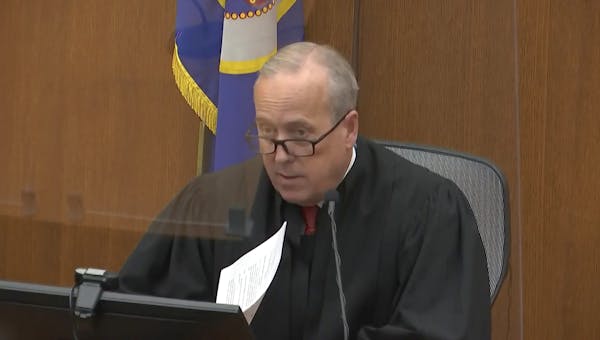Hennepin County spent about $3.7 million on the trial of former Minneapolis police officer Derek Chauvin on courthouse security and employee salaries, among other expenses.
Jurors convicted Chauvin on April 20 of all counts against him — second-degree unintentional murder, third-degree murder and second-degree manslaughter — for killing George Floyd last year. The approximately six-week trial was watched around the world and involved unprecedented security measures, a large police presence and an unusually high number of expert witnesses who testified at trial.
The county on Friday released costs for the trial. The single largest expense after salaries was security for the Hennepin County courthouse in downtown Minneapolis, which also houses county government offices, and other county buildings such as the jail. The cost — $773,412 — included barbed and razor wire fencing, concrete barricades and the boarding up of windows; it did not include the cost of staffing sheriff's deputies.
The county spent a total of $1.2 million on "facilities services," which included staff salaries and overtime, and securing county buildings. The courthouse was shut down to the general public and nearly all non-trial-related employees during Chauvin's trial.
The Hennepin County Sheriff's Office, which provides security at the courthouse, spent a total of about $2 million. The office used $18,000 for a security system to monitor drones over government buildings.
The Hennepin County Attorney's Office, which assisted the Minnesota Attorney General's Office in the case, spent $467,877 on costs ranging from salaries to food and refreshments for Floyd's family. Several of Floyd's relatives and supporters watched a livestream of the trial from a separate room in the courthouse.
The county said some of the expenses, such as salaries, would have been incurred regardless of Chauvin's trial.
The Sheriff's Office spent $787,156 on regular salary costs for 165 employees. It spent a little over $1 million on overtime pay for staff, likely deputies, because of the trial. Sheriff's spokesman Andy Skoogman said he could not say whether the sheriff's salary and overtime costs were exclusively for deputies or whether it included non-sworn staff.
The Sheriff's Office also met jurors at several suburban locations and drove them in small groups to the courthouse and escorted them back at the end of day. The unprecedented effort aimed at protecting jurors from danger and outside influence cost $21,905 in van rentals.
The county spent $300,672 on regular salaries for 46 facility services staffers and $162,906 in overtime pay for 44 such staffers.
The Minnesota National Guard, which provided additional security inside and outside the courthouse, said Friday that its Operation Safety Net cost $20 million. Costs for the Attorney General's Office and state courts were not immediately available.
Attorney General Keith Ellison has said that several attorneys outside of his office who assisted in the prosecution worked for free.
Hennepin County Attorney spokeswoman Lacey Severins and Attorney General spokesman John Stiles said the two offices split the cost of the trial equally.
The county attorney's expenses included $32,786 for "AGO trial costs," an apparent reference to the Attorney General's Office, which were not specified, and $2,150 to move "AGO Staff" to the county courthouse.
The county attorney spent a total of $427,235 on salaries and payment for labor.
Hennepin County Attorney Mike Freeman earned $17,771 for working on the case in the 11 months between Chauvin's charging to his conviction; other prosecutors in his office spent more time on the case and earned more. An assistant county attorney earned $132,232 while working on the case the entire time.
Chauvin, who knelt on Floyd's neck for 9 minutes and 29 seconds while he begged for his life, is serving a 22½-year prison sentence. His three former colleagues — J. Alexander Kueng, Thomas Lane and Tou Thao — are scheduled to be tried in state court next year on charges of aiding and abetting second-degree murder and manslaughter.
All four defendants also face pending charges in federal court alleging that they violated Floyd's civil rights. A trial date for those cases have not been set.

Want to share info with the Star Tribune? How to do it securely

'Safe recovery sites' would offer syringes, naloxone and more to people using drugs. The plan could be in peril.
New Minnesota GOP leaders seek peace with party's anti-establishment wing

Who is Republican Lisa Demuth, Minnesota's first House speaker of color?

